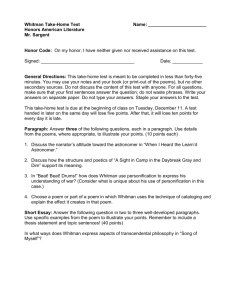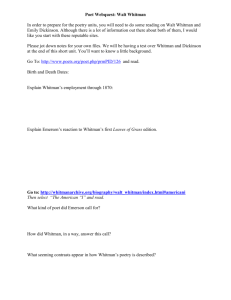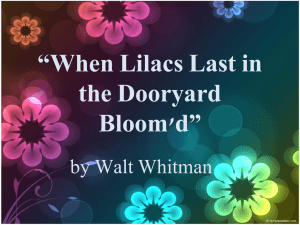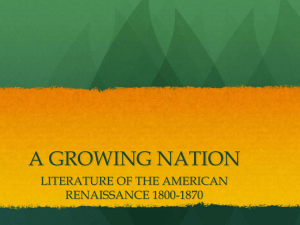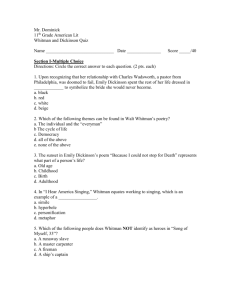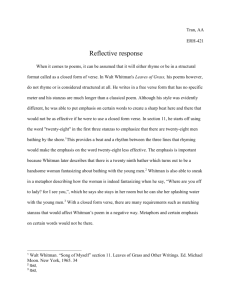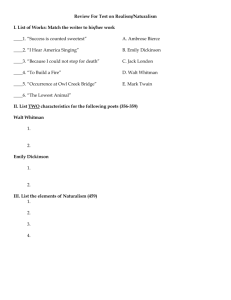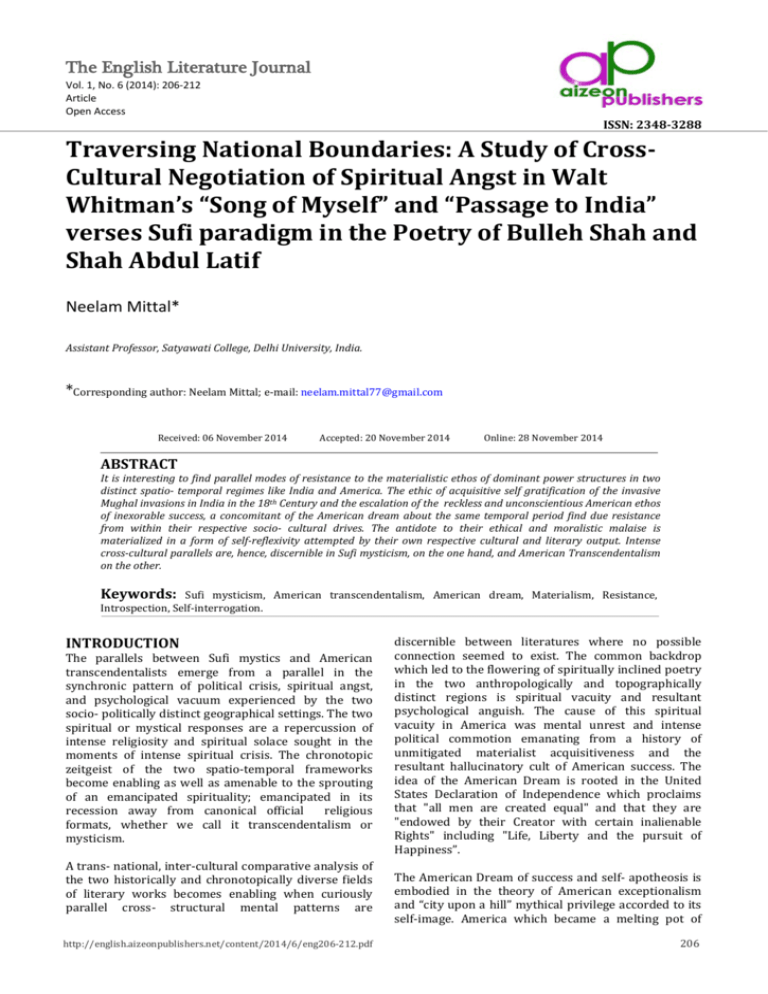
The English Literature Journal
Vol. 1, No. 6 (2014): 206-212
Article
Open Access
ISSN: 2348-3288
Traversing National Boundaries: A Study of CrossCultural Negotiation of Spiritual Angst in Walt
Whitman’s “Song of Myself” and “Passage to India”
verses Sufi paradigm in the Poetry of Bulleh Shah and
Shah Abdul Latif
Neelam Mittal*
Assistant Professor, Satyawati College, Delhi University, India.
*Corresponding author: Neelam Mittal; e-mail: neelam.mittal77@gmail.com
Received: 06 November 2014
ABSTRACT
Accepted: 20 November 2014
Online: 28 November 2014
It is interesting to find parallel modes of resistance to the materialistic ethos of dominant power structures in two
distinct spatio- temporal regimes like India and America. The ethic of acquisitive self gratification of the invasive
Mughal invasions in India in the 18th Century and the escalation of the reckless and unconscientious American ethos
of inexorable success, a concomitant of the American dream about the same temporal period find due resistance
from within their respective socio- cultural drives. The antidote to their ethical and moralistic malaise is
materialized in a form of self-reflexivity attempted by their own respective cultural and literary output. Intense
cross-cultural parallels are, hence, discernible in Sufi mysticism, on the one hand, and American Transcendentalism
on the other.
Keywords:
Sufi mysticism, American transcendentalism, American dream, Materialism, Resistance,
Introspection, Self-interrogation.
INTRODUCTION
The parallels between Sufi mystics and American
transcendentalists emerge from a parallel in the
synchronic pattern of political crisis, spiritual angst,
and psychological vacuum experienced by the two
socio- politically distinct geographical settings. The two
spiritual or mystical responses are a repercussion of
intense religiosity and spiritual solace sought in the
moments of intense spiritual crisis. The chronotopic
zeitgeist of the two spatio-temporal frameworks
become enabling as well as amenable to the sprouting
of an emancipated spirituality; emancipated in its
recession away from canonical official
religious
formats, whether we call it transcendentalism or
mysticism.
A trans- national, inter-cultural comparative analysis of
the two historically and chronotopically diverse fields
of literary works becomes enabling when curiously
parallel cross- structural mental patterns are
http://english.aizeonpublishers.net/content/2014/6/eng206-212.pdf
discernible between literatures where no possible
connection seemed to exist. The common backdrop
which led to the flowering of spiritually inclined poetry
in the two anthropologically and topographically
distinct regions is spiritual vacuity and resultant
psychological anguish. The cause of this spiritual
vacuity in America was mental unrest and intense
political commotion emanating from a history of
unmitigated materialist acquisitiveness and the
resultant hallucinatory cult of American success. The
idea of the American Dream is rooted in the United
States Declaration of Independence which proclaims
that "all men are created equal" and that they are
"endowed by their Creator with certain inalienable
Rights" including "Life, Liberty and the pursuit of
Happiness”.
The American Dream of success and self- apotheosis is
embodied in the theory of American exceptionalism
and “city upon a hill” mythical privilege accorded to its
self-image. America which became a melting pot of
206
Neelam Mittal / The Eng Lit J. 2014, 1(6): 206-212
various settlers, left into oblivion the disastrous history
of genocide, exploitation of the natives and
dehumanization of the natives, and inculcated the
absolute cult of inexorable and unmitigated American
success as the quintessential trait of American identity.
This concept came to identify the culture which now
became a mosaic, a melting pot of various cultures. But
the parameters and definition of this concept turned
out to be fallacious, superficial, detrimental and
unpromising.
An obverse of this extreme self-sure, self-confident
stance is a rampant materialism resulting in
automation of the human subject. American fiction
itself performs a self-reflexive act of exposing the
inward hollowness of a culture nurtured on excesses of
self- applause and complacency. In 1949 Arthur Miller
wrote Death of a Salesman, in which the American
Dream turns into an abortive and a barren pursuit.
Similarly, in 1971, Hunter S. Thompson depicted in
Fear and Loathing in Las Vegas: A Savage Journey Into
the Heart of the American Dream a dark psychedelic
reflection of the concept—successfully illustrated only
in wasted pop-culture excess. H. G. Wells’ The TimeMachine is a science fiction published in 1895.The story
reflects Wells' own socialist political views, his view on
life and abundance, and the contemporary angst and
disenchantment with the industrial associations, which
relegates human significance to the margins.
The detrimental impact of the cult of unbridled and
relentless success is amply exhibited in American
classics in fiction like Melville’s Moby Dick(1851),
Arthur Miller’s All My Sons(1947) and The Death OF A
Salesman(1949). Since the 1920s, numerous authors,
such as Sinclair Lewis in his 1922 novel Babbit, and
F.Scott Fitzgerald, in his 1925 classic, The Great Gatsby,
satirized or ridiculed materialism in the chase for the
American dream. For example, Jay Gatsby's death
mirrors the American Dream's demise, reflecting the
pessimism of modern-day Americans. The opposing
trend to this derogatory, disparaging, self annihilating,
self- mutilating psychosomatic state was offered from
within the American literature by the 19th C American
Transcendentalists, who in turn, were influenced by
German idealists of the late 18th and early 19th
centuries like Johann Gottlieb Fichte, Friedrich
Schelling and Georg Wilhelm Friedrich Hegel, and
Friedrich Schleiermacher.
Its chief proponents were Henry David Thoreau (18171862), Ralph Waldo Emerson (1803-1882), Walt
Whitman(1819-1892). Transcendentalists opted for a
transcendence of harsh grating factual empirical
experiential knowledge with three modalities:
single blade of grass as well as in the creation of a
galaxy:
“I believe a leaf of grass is no less than the journey-work
of the stars.”
(ii) Projecting a more holistic interpretation of the
world while focusing on moral actions and rejoicing in
their goodness:
Bounding O soul thou journeyest forth;
What love than thine and ours could wider amplify?...
What dreams of the ideal? What plans of purity,
perfection, strength?
What cheerful willingness for others’ sake to give up all?
For others’ sake to suffer all? (Whitman, “Passage to
India”, stanza 8)
(iii) Contemplating beauty and investing it with intense
symbolism : Whitman’s marvel at the splendour of
nature and inscription of God’s splendour in a single
marvellous blade of grass, majestic, autonomous, full of
resilience and fortitude.
Sufism arose in Arabia in the 9th C and as an off- shoot
of Islam. While adhering to the quintessential ethical
moralistic groundwork of virtuous, noble and righteous
life, Sufi thinkers laid emphasis on the inner worth of
the nascent purity of a pure heart, the seat of divine
source of all forms of existence.
With the percolation of traders and invaders of various
nationalities, Arabs, Turks and Afghans, Sufism was
transported to Sindh ( now in pakistan ) and north
western belt of India along with the Mughal
conquererers, with a view of propagating Islam.
However, those Sufi poets like Bulleh Shah and Shah
Abdul Latif, who endorsed humanitarian, unprejudiced,
open-minded idea of serving the divine path and
disseminating the ideology of love, asceticism,
enlightenment and getting merged in the divine source
captured the psyche of the masses. In India, in the
late18th and the early 19th C, the psychological unrest
arose from political instability, disenchantment with
the mercurial political system, chaotic religious
predicament with the authoritarianism and intolerance
of the Mughal rulers, the politicization of the religious
sentiment to maintain Islamic supremacy, to be further
complicated by the perplexity created by the divide and
rule policy of the British East India Company. In an era
of Hindu Muslim feuds, and political unrest, Sufi
mystics with impartial, unbiased eclectic approach to
religion gained prominence.
(i) A form of idealism where ideas, symbols and images
churning in the poets mind trans-create the
commonplace into the marvellous and the benevolent,
worthy of contemplation. For Whitman, the sum total of
nature’s creative process is replicated in creating a
Sufi paradigm lays emphasis on introspection,
rumination and cognition of connectedness with the
world at large, in an attempt to create a mellifluous
harmony with the empirical world and to derive life
lessons from day to day commonplace experiences. In a
world of communal schism, splintered consciousness,
materialism, utilitarianism and self- centred secession
from the common weal, Sufism attempts to salvage and
http://english.aizeonpublishers.net/content/2014/6/eng206-212.pdf
207
Neelam Mittal / The Eng Lit J. 2014, 1(6): 206-212
retrieve human mind of all human ills, self- serving
expediency, ethical flaws and fallacies.
To be 'in the world, but not of it' is the Sufi ideal. Free
from ambition, greed, pride and blind obedience to
custom, the Sufi's heart abounds with love and laughter
and indiscriminately extends bonhomie to all:
Not Christian or Jew or Muslim, not Hindu
Buddhist, sufi, or zen. Not any religion
or cultural system. I am not from the East
or the West, not out of the ocean or up
from the ground, not natural or ethereal, not
composed of elements at all. I do not exist,
am not an entity in this world or in the next,
did not descend from Adam and Eve or any
origin story. My place is placeless, a trace
of the traceless. Neither body or soul.
I belong to the beloved, have seen the two
worlds as one and that one call to and know,
first, last, outer, inner, only that
breath breathing human being.
(Jalaluddin Rumi, 'Only Breath')
Sufism
in
India
vis
a
vis
American
transcendentalism.
A significant common point of flowering of Sufi thought
as well as American transcendentalism is their
eclecticism. While Sufism, as an off-shoot of Islam,
integrates the tenets of Islam with Greek philosophy,
Zoroastrianism
and
Hinduism;
American
transcendentalism borrows from The Bhagwad Gita,
the Confuscian canon, Greek and German philosophy,
British Romantic poets, and what is more, the poetry of
the Sufis themselves. Ralph Waldo Emerson in his
essay, “The Transcendentalist,” expatiates the essence
of transcendentalism:
The Transcendentalist adopts the whole connection of
spiritual doctrine. He believes in miracle, in the
perpetual openness of the human mind to new influx of
light and power; he believes in inspiration, and in
ecstasy. (Emerson, 5)
Thoreau in Walden spoke of the Transcendentalists'
debt to Indian religions directly:
In the morning I bathe my intellect in the stupendous
and cosmogonal philosophy of the Bhagavad Geeta,
since whose composition years of the gods have
elapsed, and in comparison with which our modern
world and its literature seem puny and trivial; and I
doubt if that philosophy is not to be referred to a
previous state of existence, so remote is its sublimity
from our conceptions. I lay down the book and go to
my well for water, and lo! there I meet the servant of
the Brahmin, priest of Brahma, and Vishnu and Indra,
who still sits in his temple on the Ganges reading the
Vedas, or dwells at the root of a tree with his crust and
water-jug. I meet his servant come to draw water for
http://english.aizeonpublishers.net/content/2014/6/eng206-212.pdf
his master, and our buckets as it were grate together in
the same well. The pure Walden water is mingled with
the sacred water of the Ganges. (Thoreau, 279)
Two origins of the word Sufi have been suggested.
Commonly, the lexical root of the word is traced to
‘safa’, which in Arabic means "purity". Etymologically
the word ‘suf’ means "wool", a reference to the simple
cloaks the early Muslim ascetics wore. Connections
have been established between Sufi and Greek word
‘Sophia’, meaning ‘wisdom’.
Due to an increased awareness of the inefficacy and
inadequacy of rationalism and intellectualism to fathom
the ineffable profundity of the essence of God and
human connection with the Supreme, there grew a shift
of interest in the mystical, the symbolical and the
transcendence of empirical, experiential world of
external reality. This shift from the phenomenal
excrescences of the corporal material existence
towards an inner union with the ‘truth’ embodied in the
divine source is the quintessence of Sufism.
Hence,
quintessentially,
both
Sufism
and
Transcendentalism are instrumental in gearing the
mind inwards. Introspection and self- examination are
central to both. They cull life-affirming ideas from
diverse sources and imbibe the affirmative ideas from
across the globe without partisanship, without selfelation, and without ethnocentric self- apotheosis to the
detriment of the ‘other’.
(A)
Whitman’s
centrifugal
all-inclusive
consciousness and Sufi concept of ‘unity of being’.
Walt Whitman (1819-1892), the self- proclaimed poet
of America, offers an antidote to the American belief in
materialist ascent, centripetal consciousness, and the
ethic of control, conquest and domination. Whitman’s
first-hand multifarious experiences brought him close
to the life and struggle of the common man. His
centrifugal consciousness extends not just sympathy
towards the marginalized section of society including
the laborer, the negro, the leper, the prostitute, and the
thief, but rather empathises with them by extending his
consciousness and merging it with the consciousness of
the object of perception. The Experience of the
perceiver and the perceived become one:
I celebrate myself, and sing myself,
And what I assume, you shall assume
For every atom belonging to me as good belongs to you.
(Song of Myself, 1)
Whitman’s utopia presents an affable, all- embracing
and all- encompassing inclusion of men and women
from all walks of life to the exclusion of none.
Endless unfolding of words of ages!
And mine a word of the modern, the word En- Masse.
A word of the faith that never balks,
(Song of Myself, 23)
Here, we come very close to the ‘unity of being’
(Wahdat-ul-wujood ) of Sufi poet Shah Abdul Latif,
208
Neelam Mittal / The Eng Lit J. 2014, 1(6): 206-212
which Latif adopted from the great Persian poet Rumi.
2007 was declared the ‘International Rumi Year’ when
UNESCO celebrated Rumi as the founder of Mevlevi
order of Whirling Dervishes, with his engaging verses
exudes unflinching love, compassion and generosity of
spirit. Shah Abdul Latif, the greatest Sufi poet from
Sindh was a great admirer of Rumi’s all- embracing,
compassionate cult of transcending above our physical
exigencies and recognizing the unity of all- pervasive
celestial being immanent in all forms of life:
I speak of plural souls in name alone –
One soul becomes one hundred in their frames;
Just as God's single sun in heaven Shines on earth and
lights a hundred walls
But all these beams of light return to one
If you remove the walls that block the sun
The walls of houses do not stand forever
And believers then will be as but one soul
(Lewis, Rumi, Masnavi 4: 415-18)
Franklin Lewis in his essay “Rumi’s Masnavi, part 6:
Unity of being” aptly remarks: “ Rumi’s love is not
merely emotive, it is a theology with a fierce urgency”.
(Lewis)
Very aptly we witness the same sense of passionate
urgency in Whitman’s urge of incorporating and
assimilating the entire mankind ‘En Masse’ in his march
towards the attainment of the cosmic self.
Walt Whitman, the self-proclaimed poet of America,
expresses his dissatisfaction with attaining merely
materialistic comforts. The self of man needs to mingle
with the divine. Whitman finds difficulty in expressing
his near approximation of the ineffable experience of
proximity with that divine, mystic source of eternal
bliss:
There is that in me—I do not know what it is-- but I know
it is in me.
Wrenched and sweaty—calm and cool then my body
becomes.
I sleep—I sleep long.
I do not know it—it is without name—it is a word unsaid,
It is not in any dictionary, utterance, symbol....
It is not chaos or death—it is form, union, plan—it is
eternal life—it is happiness.
(Song of Myself, 50)
In the context of hegemony of the self- serving ethos
propagated by colonialist expansionist self- centred
bastions of self- gratification, the above two instances
exhibit parallel modes of resistance to a detrimental
frame of thought.
Hence, both Islamic invasions in India as well as British
settlement in the new found virgin land of America
propagated a cult of self aggrandisement, egocentricity,
and self- interest, be it in religious, economic or social
concerns. Disenchanted with perpetual psychological
unrest, religious fallacy, and unending urge for
accretion of more power, there was an urgent inward
shift towards the quintessential human essence. The
http://english.aizeonpublishers.net/content/2014/6/eng206-212.pdf
conglomeration of the exigencies of political unrest,
ethical vaccuum, and materialist surfeit triggered a
spiritual, mystical shift in these two distinct spatiotemporal regimes. Interestingly, the resistance to the
cult of covetousness and hunger for power and
domination came from within. Sufism, imported by
Mughal rulers to proselytise Hindus, to buttress their
own self serving political ends, itself became a source of
resistance against the ethos of covetousness and
avarice. Similarly, the anathema to the American lie
came from within American culture in the form of
American transcendentalism.
(B) Abnegation of staunch formalistic, dogmatic
and ritualistic elements in religion
Whitman feels sick of dogmas and strict rules and
regulations. He wants to put “creeds and schools in
abeyance”(Song of Myself, 1) and sing from the core of
his heart. He follows the unfailing faith, “the word EnMasse”. (Song of Myself, 23). Whitman’s “En Masse”
incorporates everyone. Here is a poet with a cosmic
consciousness: “Walt Whitman, a Kosmos, of Manhattan
the son”, repudiates human self-complacency, and a
sense of distinction, elitism and condescension towards
others:
Turbulent, fleshly, sensual, eating, drinking, and breeding.
No sentimentalist, no stander above men or women or
apart from them
No more modest than immodest. ( Song of Myself, 24)
Whitman coalesces his voice with and stands shoulder
to shoulder with
Many long dumb voices,
Voices of the interminable generations of prisoners and
slaves,
Voices of diseased and despairing and of thieves and
dwarfs.
(Song of Myself, 24)
Whitman’s democratic stance confers respect, love and
recognition for the marginalized, the poor, the
discarded, as much to the prostitute as to the prisoner
and the slave.
In a similar vein, Bulleh Shah expresses his complete
disenchantment with the complacency and authority
intoxicated bastions of official religion and charts out
his own individualistic spiritual credo of prioritizing
the
inner
voice,
without
patronization
or
condescension towards the poor, the sinner, and the
aberrant.
The hajjis go to Mecca
My bridegroom, within me, is my Mecca.
Yes, I am crazy!
Hajjis and ghazis both lie within us,
Thieves and pickpockets too.
Yes, I am crazy!
The Hajjis go to Mecca
But I am going to Takht Hazara.
Yes, I am crazy!
Wherever is your beloved, there lies Kaaba,
209
Neelam Mittal / The Eng Lit J. 2014, 1(6): 206-212
Though you search the four books.
Yes, I am crazy!
Translated by Hajji “Lok Makke Val Jande”
Bulleh Shah believes in the pristine religion of the soul,
unbesmirched with insincerity, superficiality and
ritualistic sham. He calls his calling “crazy”, suggestive
of the fanatic madness for unity with his beloved, the
divine source of his life. The last three lines
emphatically discredit the sophistic hair-splitting
pedanticism inscribed in books for the attainment of
divine bliss.
C) Identification with the divine source as central to
both Sufism and American transcendentalism
Whitman can not avoid articulating a direct connection
between the human and the divine entity. This
connection emerges from an all-pervasive, omnipresent
cosmic consciousness or what Emerson termed
‘oversoul’. Some of the early Sufis like Abu Yazid alBastami took resort to extravagancies and insinuated a
union with god as well as self- deification. The rationale
behind this concept is that all life forms emanate from
divine omnipotence, hence there’s a consequent and
implied immanence of god in all living things; further,
love, veneration and adoration of godhood, by analogy,
validates human self-deference, recognition of human
worth and sanctity of human life. Visualization of the
self in god’s image will entail human self- esteem and
consequent oneness with the essence of the divine:
Glory be to me. How great is my worth.
(Zaehner, hindu and muslim mysticism, p 76)
Al Bastami lived chronologically at the time in which
the revival and systematization of Vendantic thought
itself was being actively pursued by Shankara (d. 820):
“Shivoham Shivoham”. The great Adi Shankara (first
Shankaracharya) of the eighth century summarized the
entirety of Advaita Vedanta (non-dualistic philosophy)
in six stanzas. When a young boy of eight, while
wandering in the Himalayas, seeking to find his guru,
he encountered a sage who asked him, "Who are you?"
The boy answered with these stanzas, which are known
as "Nirvana Shatakam" or "Atma Shatakam." "Nirvana"
is complete equanimity, peace, tranquility, freedom and
joy. "Atma" is the True Self. The sage the boy was
talking to was Swami Govindapada Acharya, who was,
indeed, the teacher he was looking for:
I am not mind, intellect, ego and the memory.
I am not the sense of organs(ears, tongue, nose, eyes and
skin).
I am not the five elements ( sky or ether, earth,
light or fire, the wind and the water).
I am supreme bliss and pure consciousness, I am Shiva,
I am all auspiciousness, I am Shiva.
( Shankara Adi, “ Nirvana Shatakam”)
Bastami’s ecstatic utterances express a similar sense of
oneness with god. I cite a documentation of the same
from Al Salhaji’s Manaqib al- Bistami.
http://english.aizeonpublishers.net/content/2014/6/eng206-212.pdf
“In my search for god, I plunged into the ocean of
‘malakut’ [the realm of ideas], and the veils of divinity
[lahut], until I reached the throne and
lo!
it
was
empty; so I cast myself upon it and said: “ Master, where
shall I seek thee? And the veils were lifted up and I saw
that I am I, yea, I am I, I turned back into what I sought
and it was I and no other, into which I was going.”
(Fakhry, 273)
This is the enlightened utterance of a Sufi after a
profound plunge into the recesses of one’s heart. The
act of inner contemplation and introspection is pivotal
in the derivation of parallel conclusions by American
Transcendentalists.
Whitman expresses a parallel understanding between
the self and the divine source. The poet’s self can feel
like a blade of grass, a hounded slave, a mocking bird or
any of the many things that came before his eyes. The
poet feels a palpable sense of unity and identification
with the world around him: the ants, the mossy crabs,
with all living and non-living things. Whitman’s poetic
self is a cosmic lover. “Song of Myself” expresses the
theme of the vision of love leading to a knowledge of
universal brotherhood:
And I know that the spirit of God is a brother of my own.
(Whitman )
Unremitting faith in divine bliss enables the poet to
venture on to a spiritual journey and to cross the tough
seas:
“The seas all cross’d, weather’d the capes, the voyage
done,
...God yieldest, the aim attain’d, as fill’d with friendship,
love complete, the Elder Brother found,
The younger melts in fondness in his arms.”
( Whitman, “Passage to India”, stanza 8)
The union with the divine source is envisaged in terms
of love, adoration and propinquity, and not in terms of
awe- inspiring consternation.
(D) Emphasis in Sufism as well as American
Transcendentalism
on
perceptive
intuitive
knowledge instead of pragmatic empirical
knowledge.
Walt Whitman, the poet of world’s oldest democracy,
who maintains throughout Leaves of Grass that he place
body and soul at equal pedestal: “ I have said that the
soul is not more than the body”, is forced to confess the
primacy of the journey of the soul over worldly
expeditions in his poem “ Passage to India”. After
expressing his great adulation for scientific
advancements, innovation and exploration which has
brought Europe and
Asia together, poet expresses his greater exultation for
something closer to his heart:
Passage O soul to India!
Eclaircise the myths Asiatic, the primitive fables.
Not you alone proud truths of the world,
Nor you alone ye facts of modern science,
but myths and fables of old, Asia’s , Africa’s fables,
the far darting beams of the spirit, the unloos’d dreams,
210
Neelam Mittal / The Eng Lit J. 2014, 1(6): 206-212
...
The daring plots of poets, the elder religions...
(Whitman, Passage to India, stanza 8)
Walt Whitman rejoices at the opening up of new vistas
for the spiritual journey of the soul. There’s a strong
similarity between the sense of absolute faith and
unmitigated resolution in the mind of the spiritual
seeker in Shah Abdul Latif’s “Sur Sohni” from his Risalo
and Whitman’s “Passage to India”. Sur Sohni is an
emphatic registration of the inordinate capacity of
complete submission and sacrifice of which a
passionate lover of god is capable. In order to reach
divine bliss, Sohni embarks on a single- minded
ruthless intrepid journey, undaunted by the dreadful
terrors of the wintry night and the torrential rains, nor
worry about the precariousness of the jar of unbaked
clay by means of which she desires to cross the
tumultous river:
“ So many, many line the banks—
‘Sahar’. ‘Sahar’. They cry—
Afraid some to risk life,and some
Renouncingly would die, But Sahar meets, who without
sigh
Joyfully waters seek”
( Risalo, 8)
(E) A dialogue concerning the validity or lack of
validity of the mystical and the transcendental
perception of the poets.
A poet is free to express his inmost feelings in his own
iconoclastic/ idiosyncratic set of symbols, images and
response to the object of perception. At some point in
our understanding of Whitman’s eulogy of nature and
the profound human connection with this sterling,
pure, serene arena, a critic may aptly question the
validity or ingenuity of the poet’s feelings.
Dana Phillips in his essay “Ecocriticism, Literary
Theory, and the Truth of Ecology” [ which appeared in
the journal called “Ecocriticism” in Vol 30,No.3,
Summer, 1999] begins with the question posed by
Umberto Eco in his 1975 essay
“ Travels in
Hyperreality”:
“Where does the truth of Ecology lie?”
Implicit are two questions: (i) What is the truth of
ecology? (ii) In what ways the truth of ecology can
emerge as a lie, a falsity?
Not just that, she even establishes a kind of harmonious
relationship with the elemental forces of nature,
blessing them for their formidable strength:
The questions amount to the nature of literature and
the literature of nature. Dana Phillips weaves up an
intricate argument suggesting the lack of validity of
classical ecologism which blankly asserted that
everything is related to everything else:
This is the establishment of absolute harmony and
identity with the tumultous, the cacophonous world of
external reality and dismantling any sense of duality or
conflict or antagonism with the empirical world.
The refutation of such an argument is that we need to
distinguish scientific truth from poetic truth. The
scientific non-validation of poetic discourse turns out to
be reductive.
“Blest be dark night,the Moonlit night
Be thou so far away, so that except Mehar’s, I may
Not see another face.”
(Risalo, 8)
Walt Whitman’s “Passage to India” reinforces the
commencement of a parallel spiritual journey of the
Soul with the aim of realizing the true fonts of human
existence:
“O we can wait no longer,
We too take ship O soul, Joyous we too launch out on
trackless seas,
fearless for unknown shores on waves of ecstacy to sail,
Amid the wafting winds...
Caroling free, singing our song of god, chanting our chant
of pleasant exploration.
with laugh and many a kiss...”
(Whitman, Passage to India, stanza 8)
This journey of the soul is reserved for the fearless, the
resolute, the unwavering and the committed. Sohni and
Whitman’s poet persona both launch on a journey for
union with their spiritual counterparts without anxiety,
apprehension or unease about the outcome or possible
faliure and discomfort.
http://english.aizeonpublishers.net/content/2014/6/eng206-212.pdf
“such concepts have not proved amenable to scientific
confirmation, however ripe they may be for poetic
affirmation”. (Phillips, 578)
This is evident from the circuitous route which
cognitive knowledge and western philosophy have
traversed from the ancient philosophy of Heraclitus’ “
all is fire, chaotic and transitory”, to Zeno’s “ all is one,
change is impossible”, to the Socratic method of
dialogue to arrive at the truth, to Aristotelian logic to
attest the validity or otherwise of an argument to
Renaissance
rationalists
vouching
for
an
anthropocentric universe and the great chain of being,
and ending with the modern and the post-modern
paradigms , the latter attesting to a sense of solipsism,
unknowability, indeterminacy, multiple interpretations,
and infinite recession of meaning. This is reminiscent
of Lucky’s speech in Samuel Beckett’s existentialist play
Waiting for Godot, where he presents a grotesque,
gloomy, disappointing kaleidoscope of the faliure of
civilization to endorse any knowledge system with the
finality of conviction.
Whitman’s cosmic consciousness and his concept of allinclusive eclectic approach to the world of nature as
much as to the human world is intuitive, and not
substantive. The substantive or the material paradigm
of a text belongs to the realm of the obvious, the
211
Neelam Mittal / The Eng Lit J. 2014, 1(6): 206-212
discursive, the literal, the minimal, the pragmatic, the
scientific, the overt. Literature, in general, and poetry,
in particular, belongs to the realm of the symbolic, the
covert, the intuitive.
Lawrence Buell, a pioneer of eco-criticism and a great
admirer of Emerson, in his book The Future of
Environmental Criticism(2005) aptly vouches for the
basic idea that environmental crisis is caused by the
schism between between nature and culture and a
preponderance of the latter over the former. Science
and technology, a result of fertile human intelligence
and an urge for greater comfort and luxury, turned out
to be abortive when human beings started meddling
with nature and simultaneously desecrating human
dignity in their colonizing missions of over-powering
the ‘other’.
Analogies have been drawn between
ecosystems and works of literature and it has been
understood by critics engaged in cultural ecology that
such texts have an ecological, regenerative, and
revitalizing function in a cultural system.
colonialist agenda in the two distinct chronotopic
regimes. Interestingly, the American dream of
happiness found its haven, not in imperialist
expansionist policies in turn exerted on other
territories, but in the reversion back to the basics, the
oriental philosophy of The Bhagwad Gita, and the
Upanishads. Sufi imagination drove them away from
the grating cacophony of worldliness, rationalism, selfcentered egotism and self- interest and enabled them to
connect with the eternal font of life, the divine, the
ethereal, the unity of being, which can blossom in the
inner sterling soul of mankind. In both the sociocultural chronotopic regimes, the resistance to the
colonialist materialistic self- serving cultural ethos is
exerted from within the detrimental hegemonic credo
via Sufi mysticism and American transcendentalism.
REFERENCES
Both American transcendentalists and Sufi poets
engage in charting out a new arena of human
continuum with the world of nature, the
incommunicable truths of higher life, the divine, the
spiritual, the eternal. There may be no substantial proof
for their exegesis. Their articulations belong to the
realm of intuition, the palpable, the impressionistic
sensitive imaginative minds open to humanistic life
lessons derived from the world of commonplace
experiences. When colonial ascendency, dominance,
supremacy and authority and when materialist surfeit
fail to satisfy the mind, the answers are sought in the
numinous world of introspection, self- interrogation,
the mystical and the transcendental. Hereby, both
create alternate value systems and undercut the
scientific, the pragmatic, the convenient, the expedient,
the materialistic, acquisitive, expansionist and the
1.
2.
3.
4.
5.
6.
7.
8.
Thoreau, Henry David. Walden. Boston: Ticknor&Fields,
1854.
Emerson, Ralph Waldo. “The Transcendentalist”
Whitman,
Walt.
“Song
of
Myself”.
http:/www.english.illinois.edu/maps/poets/s_z/whitman.
10 october,2014.
Whitman, Walt. “Passage to India”. http;//www.bartleby.
com/142/183.html. 10 october, 2014.
Latif, Shah Abdul. Risal. Trans Elsa Kazi. Sind: Sindhi Adabi
Board, 1965.
Rumi, Jalaluddin. “Breath”. http:/ www.poemhunter.com/
poem/Only Breath. 9 September, 2014.
Shankara, Adi. “Nirvana Shatakam”. http:// www.desitip.
com. 9September, 2014.
Phillips, Dana. http://www.jsor.org//stable/20057556. New
Literary History, vol 30, No. 3, Ecocriticism ( Summer, 1999),
pp.577-602. 29 July, 2014.
© 2014; AIZEON Publishers; All Rights Reserved
This is an Open Access article distributed under the terms of
the Creative Commons Attribution License which permits
unrestricted use, distribution, and reproduction in any
medium, provided the original work is properly cited.
*****
http://english.aizeonpublishers.net/content/2014/6/eng206-212.pdf
212


